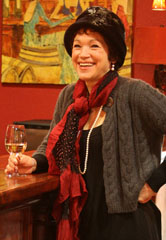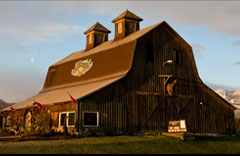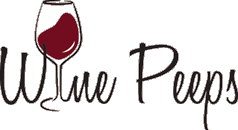Women of Washington Wine: Kathy Charlton of Olympic Cellars
By Kori ~ August 24th, 2009.
Today’s post is part of a series featuring the Women of Washington Wine. In an industry once dominated by men, more and more women are joining the ranks as winery owners, vineyard owners, and winemakers. Being a woman myself, I am fascinated by these women and what they have done and continue to do. Through this series, I hope to introduce you to some of the brightest female faces in the Washington wine industry.
 Kathy Charlton and her husband Ralph, along with another couple, bought Olympic Cellars in 1999. Located in Port Angeles, Washington, Olympic Cellars (originally named Neuharth Winery) was one of the first 15 wineries in the state and the first on the Olympic Peninsula. In 2002, under Kathy’s leadership, the winery became officially women-owned and operated. Kathy, Libby Sweetser, and Molly Rivard are affectionately referred to by the locals as the Olympic Women in Wine. Currently, the “only rooster in the hen house†is winemaker Benoit Murat who hails from Toulouse, France. Olympic Cellars is also committed to philanthropic giving through their Charity of Choice and 2X Success programs.
Kathy Charlton and her husband Ralph, along with another couple, bought Olympic Cellars in 1999. Located in Port Angeles, Washington, Olympic Cellars (originally named Neuharth Winery) was one of the first 15 wineries in the state and the first on the Olympic Peninsula. In 2002, under Kathy’s leadership, the winery became officially women-owned and operated. Kathy, Libby Sweetser, and Molly Rivard are affectionately referred to by the locals as the Olympic Women in Wine. Currently, the “only rooster in the hen house†is winemaker Benoit Murat who hails from Toulouse, France. Olympic Cellars is also committed to philanthropic giving through their Charity of Choice and 2X Success programs.
I had the pleasure to meet Kathy Charlton last month. Shortly thereafter, she was kind enough to take time out of her busy schedule to answer some questions for me and our Wine Peeps readers in a telephone interview.
Highlights from Q&A with Kathy Charlton:
How did you first get involved in the wine business?
It wasn’t planned. My husband and mother-in-law had invested in some commercial property up here on the Peninsula with two other investors in the 90’s. We were approached by Olympic Cellars which was owned by Dan Caudill. The winery had changed names from Neuharth Winery, upon the death of the founder in the early 90’s, to Olympic Cellars.
My husband called and said, “How would you like to buy a winery?†And I said, “That’ll make good dinner conversation.†He said, “No, I’m serious.†The winery had gotten into cash flow difficulties. Basically it was going bankrupt and unbeknownst to us, my mother-in-law had co-signed the loan. So we bought a winery and were naïve enough to think we could run it from Dallas. We started putting our money in it. Two years later, I had an opportunity to take an early retirement, and we came up here and took over the operations.
Then I had a steep learning curve.
What were the steps that led to where you are now?
I stood behind the bar for the first two years; there was only me and a part-time winemaker, Sara Gagnon who now owns Harbinger Winery. She apprenticed under Dan Caudill who was the second owner/winemaker. By standing behind the bar, I got a real feel for the customers. We get a lot of people who have come to the Peninsula on vacation and they drop in. My first question usually is, “What type of wine do you normally drink or enjoy?â€Â Depending on their answers, I can take them on a couple of different flights. I decided we were going to have a wider range of wine than our small business should be doing. Early on we were producing 1,500 cases per year, now we are at 3,500. We have 17 different wines.
Has being a woman been an advantage or a disadvantage in your wine journey? Please explain.
About 2005, we had a media frenzy about wine for women and the statistics came out about women’s buying patterns. The studies said that women bought 70 percent of the wine and drank 50 percent. As a woman-owned business, we got pulled into a lot of stories people were doing, and we got a lot of good exposure. I think the best thing from my standpoint is that I look at how my business has evolved. I came into with a business background and no preconceived industry ways of doing things. I have been a non-traditional winery from the very beginning. As I’ve learned more about the industry, I feel like I’m straddling a line. I want to be recognized by the industry for the great wines we’re doing, for the vineyards we’re sourcing grapes from, and all the accolades that are a part of being in the wine business. On the other hand, we really enjoy having fun at the winery. Three women in second careers, doing some wacky stuff that doesn’t necessary go with what you expect at a winery. It’s the whole “working girl†persona and the industry persona.
Do you believe a woman has certain built-in traits that can make her a better winery owner than a man? If so, please explain.
I don’t know if a woman is a better winery owner but rather has a different style of doing business. This goes back to my corporate days. There was just a different style of doing business. I can run the numbers with the best of them. When I came and started running this small business, I had burnt out. I had literally hit the wall and was ready to try something new. I got that back as I started being able to be more creative.
We said, “Wow! We have to be profitable; we are going to donate.†I was getting a stack of bills and a stack of requests for donations, and logically I knew that a bottle here and a bottle there were not going to make a big difference or a significant impact to an organization. We forecast what we could do and based it on the sales of our Working Girl wines. We decided to write a check every month and start with one charity. As we grew, we’ve been able to take on other non-profits and tie a wine or an event to them. We put a little soul and meaning and purpose to what we were doing, and I needed that.
 Do you use the fact that you are a woman to promote your wines? If so, how?
Do you use the fact that you are a woman to promote your wines? If so, how?
I have been very careful with that. In the beginning, I did some research on women in wine, in wineries. There weren’t that many of us. We talked about that but didn’t overtly do that. The story behind the Working Girl wines…I found that wineries did second labels. So we were blending and blending too much one night, I leaned back and said, “Ladies, I’m exhausted, this working girl has got to go home.â€Â We all sat up and said, “That’s it, that’s who we are.†It became the Working Girl White.
Are there more opportunities available to women today in the wine business than when you started?
Oh yeah. This is like any other industry. I was in finance, and when I was in school, there were only two or three women in accounting and finance. When I went to Texas Instruments, there were only a few women in management. And it’s grown and grown and grown. I think the wine industry is just behind some of the other industries. Women are the best sales people. I have been to umpteen dozen tasting bars, and they relate better.
What advice do you have for a woman wanting to get involved in the wine business today?
I’d tell her to work in a winery first. Depending on where she wants to be, from the chemistry side, from the enology side, if she wants to be a winemaker, go down that path. Distribution is a hard life. Retail is a hard life. Each is different and you have to decide what your skills are.
I don’t think there’s any limitation because of sex. The limitation would be where your talent is, what you want to do. I would give the same advice to anyone going into school or going into business, really understand what you want to do with your life, there’s lots of different aspects of the wine industry.
What are your thoughts about the Washington wine industry, in general?
I’m glad I’m in Washington, not in California. To get a bankrupt winery, I was early enough there were only 200 wineries, the industry was still growing and relatively young. You don’t have to be a Château something or have a huge amount of money behind you.
In recent years the Washington wine industry has grown at a rapid rate. Do you expect that trend to continue?
I don’t see an end to it. With the economy, we’ve been a little more cautious. There have been some wineries that have gone under. If they didn’t have a good business model, they couldn’t survive last year. We don’t have some of the issues in our vineyards that California does because we’re more spread out. We just haven’t used every square inch of dirt, which then disease spreads. I’ve read that difference is why we’re having some of the great vintages we are.
I understand that your Working Girl series of wines were “created by women in support of women.†Could you share a little bit about these wines and the philanthropic efforts of Olympic Cellars?
The Working Girl is pretty special to us. When we decided to do that blend and came up with the label and the name, it really helped us rebuild the winery. There was, and is today, an emotional connection to those labels. The winery is known as the home to working girls for many reasons. We do connect it with non-profits. One of the other things we have is a program called 2X Success. I really needed dedicated volunteers. Then it just happened a lot of non-profits were writing grants as it’s become harder and harder to find money. If you work at the winery, for every hour you work, you earn a bottle of Working Girl wine and it goes on the books. I have five organizations that volunteer for events, bottling, and crush. They’re lined up, they’re ready, they work their day, and they sign their name in with how many hours they worked. People come in and look at the book to see how many cases they’ve earned to date. Then they either have their own fundraiser or we open the doors to the winery, and they just have their fundraiser there. That’s worked really well for us. We’ve become very involved in the community through the working girls.
What is your vision for the future of Olympic Cellars?
I’m at the point where someday there’s going to be an exit strategy. I don’t have children that are going to carry on Olympic Cellars. I want to see vineyards on the Peninsula grow and thrive. We’re always coming up with new and different things to do with the winery. Events, music, and so forth. Usually, I always have a three year plan, and I don’t have it right now. The economy is such that we just can’t do things. It’s not business as usual. You made me realize what’s happening…ten years ago I was learning how to run a winery, now I’m learning how to run a winery differently in this new economy. So I’m sitting back, digging in, and going through a steep learning curve again.
—
Many thanks to Kathy for sharing her story and thoughts with us. I wish her all the best and will be following her work and Olympic Cellars with great interest, and I hope that you will too.
(Photos from Olympic Cellars)
Filed under: American Wine, Interview, Washington State Wine, Women of Washington Wine

 Wine Peeps is an independent wine blog dedicated to helping you get the most bang for your buck in wine. We do this through blind tastings of wine from around the world and calculations of
Wine Peeps is an independent wine blog dedicated to helping you get the most bang for your buck in wine. We do this through blind tastings of wine from around the world and calculations of 










